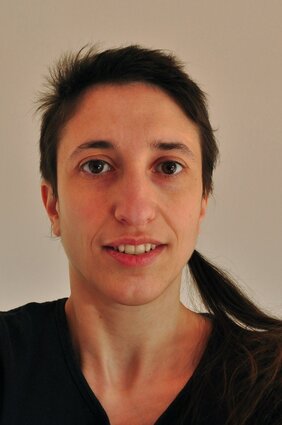As of July 17, 2023, Prof. Dr. Michela Mapelli will be new professor in Computational Astrophysics at the Centre for Astronomy of Heidelberg University (ZAH). She is the leader of our new research group “Demography of Black Hole Binaries in the Era of Gravitational-Wave Astronomy (DEMOBLACK)". The new group will be hosted at the Institute for Theoretical Astrophysics (ITA).
Michela Mapelli studies the formation channels of binary black holes with numerical models. For several decades astrophysicists speculated about these exotic systems, but it was only in 2015 that the detection of the first gravitational-wave signal by LIGO proved their existence. Her team is very excited because the fourth observing run of the LIGO-Virgo-KAGRA collaboration has just begun and they expect several ten new event candidates in the coming months. Prof. Mapelli is also planning for the next-generation ground-based gravitational-wave detectors, Einstein Telescope and Cosmic Explorer, which will probe the evolution of binary black holes across cosmic time with her group being actively involved in the Einstein Telescope Collaboration, especially in the development of the science case.
Michela Mapelli is Italian, originally from Milano, where she got her Master in Physics. She then moved to Trieste where she obtained her PhD in Astrophysics from the International School for Advanced Studies (SISSA/ISAS) in 2006. After her PhD, she has been a postdoctoral fellow in Zurich. In 2010, she got a permanent research position at the Italian National Institute for Astrophysics (INAF) and in 2017 she moved to Innsbruck University as a fixed-term full professor. At the end of 2018, after obtaining an ERC Consolidator grant, the University of Padova offered her a tenured associate professorship.
"I started getting fascinated about black holes and computational astrophysics during my Master thesis" she remembers. Now, she is a world leading expert on developing binary population synthesis and dynamical codes, and uses them to study the formation of compact object binaries via massive star evolution and dynamics of dense stellar systems.
Michela Mapelli will also be member of the STRUCTURES Excellence Cluster at Heidelberg University. She mentions two examples why STRCUTURES will be an ideal research environment. "With gravitational-wave data, we have just started to probe the existence of (sub)structures in black hole populations, especially their mass and spin distributions. These structures of black hole populations will help us understand the formation of such systems; they are like a Rosetta stone that we can use to interpret them, but we are still missing some important clues," she explains and adds that complementary to this, it will soon be possible to use binary compact objects to probe the emergence of structures in the Universe. "With the Einstein Telescope we will see every stellar-sized black hole merger in the Universe and can use them to trace the formation of their host galaxies and progenitor stars. STRUCTURES will be the perfect environment to pursue such new research lines," Prof. Mapelli emphasizes.
Michela Mapelli has been to Heidelberg quite often in the past - about twice a year for conferences and workshops and has fallen in love with the town. "I find this opportunity tremendously attractive for the international standing of the University, the great variety of topics covered by the astrophysics groups, and the possibility to start new collaborations, not only with astrophysicists, but also with people from other research areas represented in the STRUCTURES Excellence Cluster."
We are very happy to welcome Prof. Mapelli at ZAH and wish her all the best.
CONTACT
Prof. Dr. Michela Mapelli
Institute for Theoretical Astropyhsics (ITA)
Albert-Ueberle-Str. 3-5
Email: mapelli@uni-heidelberg.de (as of July 17)
Personal website: http://demoblack.com/

